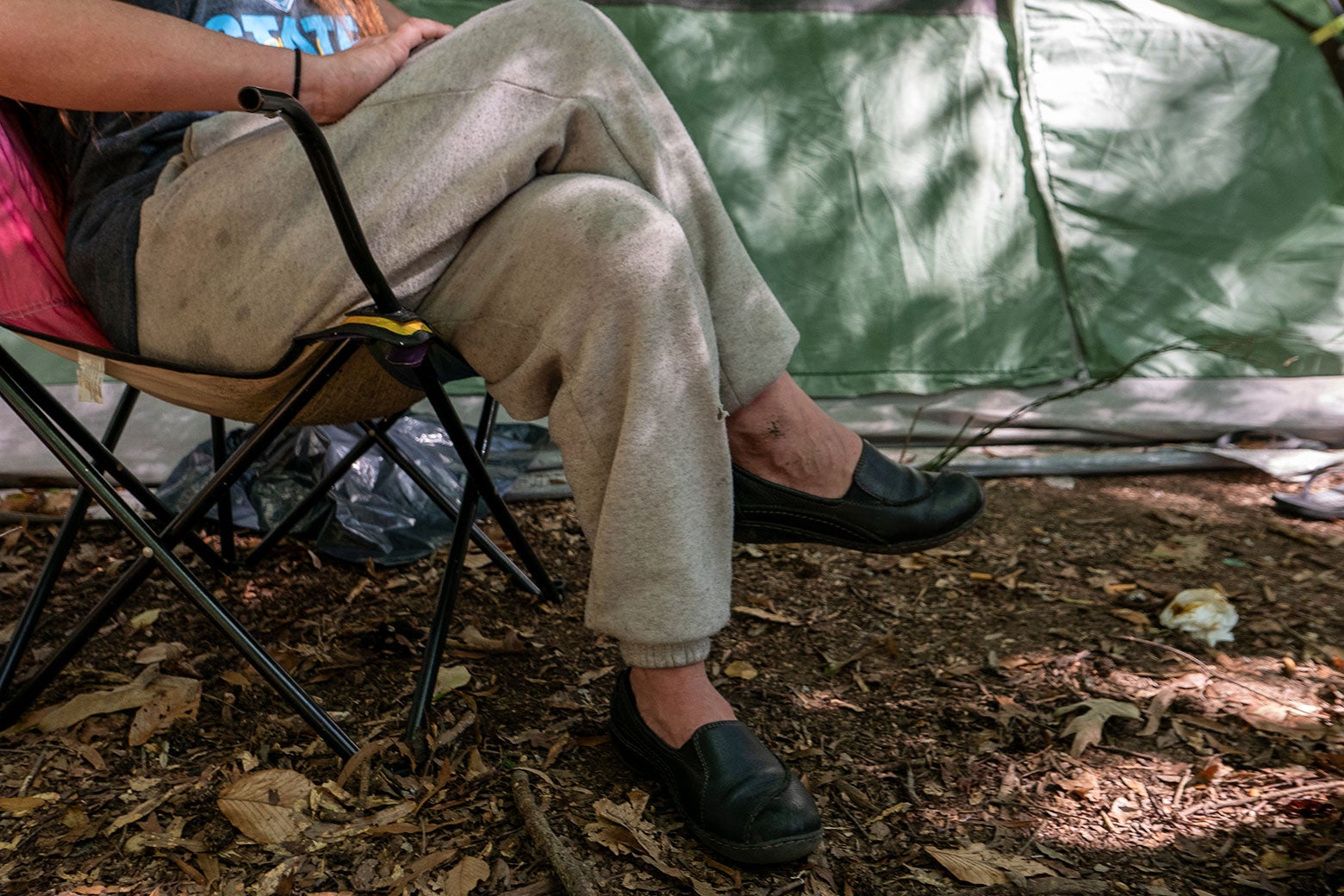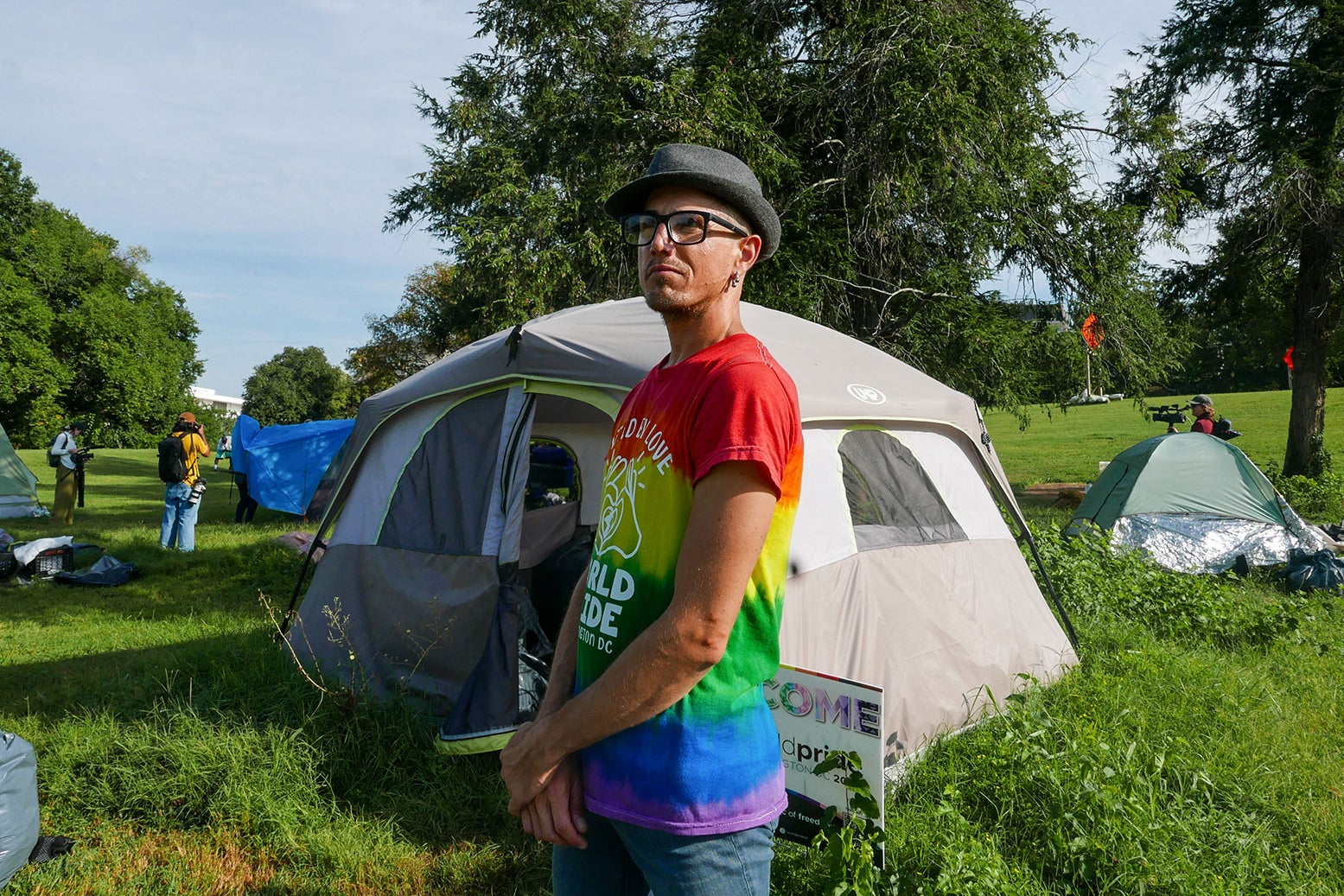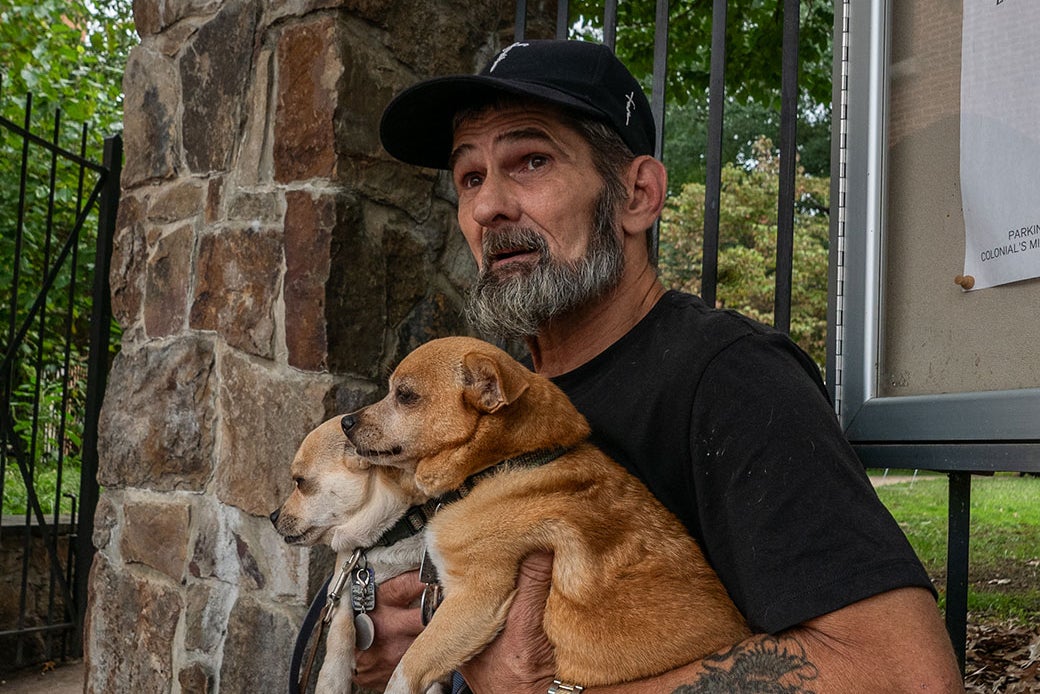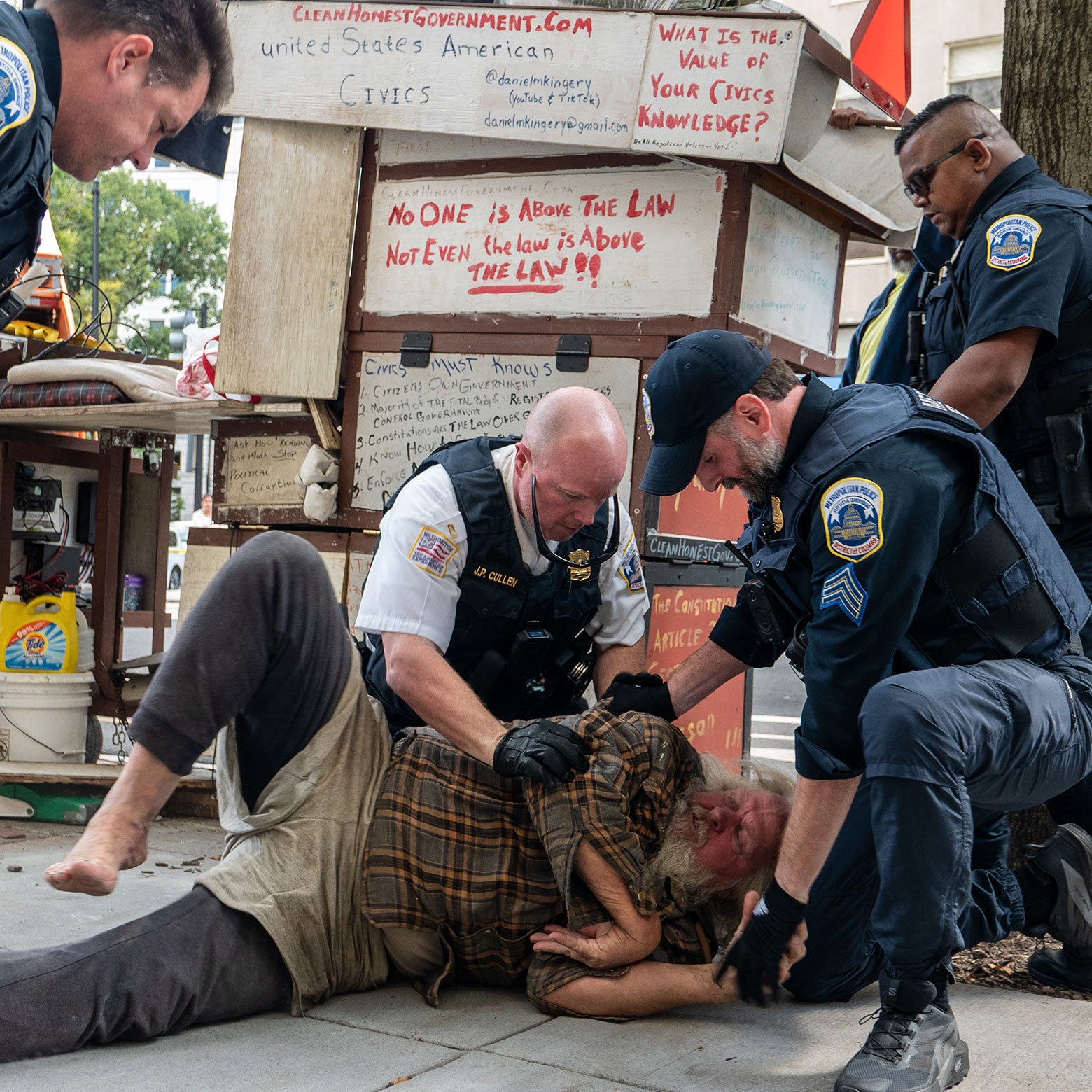Meghann Abraham was on the phone with her father when the police arrived. He’d called Abraham after reading in the national news that FBI agents had visited his daughter’s tent as part of President Donald Trump’s D.C. law enforcement surge. He wanted to make sure she was OK.
As Abraham reassured him, an officer from the D.C. police beckoned her over. Abraham told her father she had to hang up.
“We’re clearing all this up today,” she remembers the officer said.
The next hour was overwhelming and anger-inducing.
As the officers trashed the tents and belongings of her neighbors, Abraham hurriedly sifted through the contents of her life. Between her clothes, mattress, dresser, table, and camping chairs, she debated what she should take. Her boyfriend was at work at the time, so she’d have to carry it by herself—where to, she didn’t know.
Until Aug. 15, Abraham had been living with her boyfriend in a tent along Washington Circle in downtown D.C. It was close to many of the social programs she visited daily, and she liked the community nearby. It felt like the kind of place where if she didn’t return to her tent for a couple of days, her neighbors would go looking for her.
Now, a month and a half after police cleared Abraham’s encampment, the couple is living deep in the woods in a remote corner of the District. Abraham is a two-hour bus ride from the programs she frequents, and even further from the neighbors she’d grown to rely on. “It’s not [just] the social services, it’s not the charitable organization, it’s us together,” Abraham said. “Now we’re in four different quadrants, when we used to be neighbors.”
“And a lot of this is not solving anything,” she added.
Advertisement
Advertisement
Advertisement
Advertisement

For a week in August, people without housing in Washington were at the center of Trump’s efforts to consolidate power. Trump labeled them a scourge and used their existence as justification for militarizing the capital and taking control of local law enforcement. At the time, much of the national debate revolved around our democracy and its decay, a debate that has since refocused on troop deployments in Chicago and Portland. But the people targeted were never just political pawns—they were always humans living in the most fragile of circumstances. And long after the national debate has moved on, they remain haunted by the capital’s new posture toward homelessness.
Advertisement
Advertisement
We closely followed six people who were displaced during the takeover. Two of them have chosen to flee D.C. entirely for green space in Virginia. Four have stayed in D.C., including Abraham and her boyfriend. From stairwells to metro stations to the grounds of the Pentagon, they’re all still sleeping outside. All six have lost belongings and suffered exhaustion and physical ailments since their abrupt clearings. None of them are closer to housing.
On Aug. 11, Trump federalized D.C.’s police and deployed the National Guard as well as hundreds of federal agents to the District with the primary goal of reducing crime. During the press conference announcing what the president called a public safety emergency, Trump framed homelessness as a contributor to the city’s crime problem and directed law enforcement to remove tents and potentially arrest people for sleeping outside.
Advertisement
Two days after Trump’s announcement, on Aug. 13, D.C. officials began preemptively clearing encampments. The next day, federal law enforcement officers visited Abraham’s encampment at Washington Circle, but did not clear the tents there. Then, four days after the takeover began, the D.C. police, which were under federal control, cleared five separate sites throughout the city[1]. More federally mandated encampment clearings followed in the coming weeks, even as the city ramped up its own schedule of standard encampment clearings. In total, at least 35 encampments have been cleared since then.
Advertisement
Advertisement
Advertisement
Three weeks into the federal takeover, D.C. conducted a census of people sleeping outside, similar to the city’s annual Point-in-Time Count, where teams survey the entire District on foot for people experiencing homelessness. The city found[2] relatively the same number of people—over 750—sleeping outside as in January. Now, nearly a month later, tents are scarce, but people remain outside.

Advertisement
This August wasn’t the first time Jesse Wall had experienced an encampment clearing—he’d been cleared four times in the last six months. But this was the first time he was forced to move after the president of the United States took a photo of his green-and-gray tent and posted it to social media[3], declaring: “The Homeless have to move out, IMMEDIATELY.”
Advertisement
Advertisement
Sitting at a park picnic table in Crystal City, Virginia, the morning light casting shadows over his face, Wall fiddled with the strap on his backpack. He’d risen before 6 a.m. to make the nearly two-hour round-trip journey for breakfast at a familiar meal program in D.C. and now was waiting for the local public library to open.
The city cleared Wall’s encampment on Aug. 14, just days after Trump posted photos of it on Truth Social. The day of the closure, Wall packed up his stuff as news crews descended onto the highway median where he’d been living for the past couple of months. He spent the next day in a hotel paid for by a local mutual aid group, but he couldn’t even rest or enjoy sleeping indoors for a change. “I had to sit there and be thinking and planning about the next mode for survival, the next place where I could go. It wasn’t offering any sort of peace or serenity,” he recounted. “It was feeling pushed, feeling forced, feeling like I didn’t count as a person in D.C.”
Advertisement
Wall significantly consolidated his things so he’d be more mobile in case he had to move again. Among the stuff he misses most are his pillows; it’s hard to get a good night’s sleep without them. After leaving the hotel, he spent a couple of days sleeping on the grounds of the Pentagon, before being told by a local police officer that he couldn’t stay there. Now, Wall’s tent is set up in a grassy patch nearby, and he spends most days commuting into D.C. to access meal programs and a queer-affirming day center. Hauling his laundry across state lines to the day center is particularly frustrating, he told us.
Advertisement
Advertisement
Advertisement
Across the river in D.C., David Beatty, a former neighbor of Wall’s, recounted similar feelings. Beatty is a devout Catholic who attends Mass multiple times a week. He’s not only critical of Trump’s approach to homelessness but also thinks his position on immigration isn’t Christian. He’s even devised his own parable to demonstrate that earth, like heaven, should have no quotas on entrants. “His lack of mercy is not going to get him to have God show mercy to him,” he told us.
Advertisement
Since the clearing, Beatty has been sleeping outside without shelter. He discarded his tent during the closure and isn’t sure when he’ll put one back up again. For now, he’s content to spend his days sweeping and gardening outside of St. Stephen’s and his nights tucked under an overhang at a nearby metro station. “It looked like anywhere you set a tent up around here, they were just coming in, taking it away,” he said. “If you left it, you’d come back and it’d be gone.”
That’s exactly what happened to Jeff Padgett.

Earlier this summer, Padgett returned to D.C. after living with his brother in Baltimore and then spending a month in San Diego. Remembering the stress of encampment clearings he’d experienced at Whitehurst Hill last fall[4], he was wary of sleeping outside in the District again, especially as outreach workers warned there could be stricter enforcement against camping with Trump in office. Instead, Padgett and his two dogs, Puppet and Luna, set up camp across the Key Bridge in a wooded part of Virginia. Padgett would walk the couple of miles into D.C. to stay connected with his caseworker and social services.
Advertisement
Advertisement
Advertisement
“I think it’s messed up,” he said. “They asked me to leave the District, right? I pay my taxes. I have a right to be wherever and not be harassed.”
When the federal takeover started, Padgett felt called to step up and speak to the press, feeling safer while sleeping in Virginia. Days after his interview with CNN went live[5], he came home to nothing.
About five tents remained untouched nearby, but all that was left of Padgett’s belongings was the dust beneath his tent. Trinkets from his Boy Scout days, winter sweaters for the dogs, and $60 worth of food were among his missing belongings. It’s unclear if park police took the tent, since Padgett was on federal land, or if it was stolen.
The wet, cold nights triggered Puppet to have three seizures. To take care of his girls, Padgett skipped meals and went days sleeping in the rain with just a sleeping bag to keep them warm and full. Padgett prays daily to help him manage the pain of his third bout of cancer and the multiple herniated disks that sleeping on the ground aggravates.
Advertisement
He’s spent two-thirds of his monthly Social Security check to replace what was lost and is worried about how he will last the rest of the month.
Advertisement
Advertisement
Everyone we spoke to recounted losing or giving up important belongings due to the encampment closures. Beatty abandoned his tent and is now sleeping outside, like Padgett.
Abraham was able to move a lot of her belongings from Washington Circle with the help of local outreach workers. But then she lost most of them in another clearing, also federally mandated, about a week after D.C. police first showed up at her tent. Abraham didn’t know that at the time. She had just come back to her spot after meeting her boyfriend for a few minutes, and all her belongings were gone.
Advertisement
“I was so incensed, so mad, I yelled to the world and walked away. All I was told is that it was thrown out,” Abraham said. Among the things she misses most are her clothes, including a green-and-white dress with a swirl pattern and a blue-and-white striped skirt. Now, the clothes she’s left with make her feel like she’s not herself.
Advertisement
“I’m walking around looking like a bum because I’m wearing bum clothes,” Abraham told us. “I used to look like a woman.” These aren’t the only new challenges Abraham has faced since the clearings; she’s acquired a mysterious, slow-to-heal wound on her foot, and somewhere in the process of scouting a new spot and hauling her stuff across the city, she lost her phone.
Advertisement
While Abraham turned to the woods to stay under cover, in the alleys of Georgetown, G. and his friend K. found shelter from the rain and clearings in a narrow alcove behind a stairwell on private property. G. lost his tent and a stash of his belongings during the federally mandated Aug. 15 clearings carried out by local D.C. police, but he was able to save one of his bikes. Over the past year, G. has been no stranger to encampment clearings. He’s lost tools, scooters, and generators during at least eight city encampment clearings. But G. continues to wait for his housing voucher and keeps “goin’ with the punches.”
Advertisement
While he was offered shelter at a new non-congregate shelter, G. turned the spot down because they would only allow him to bring two bags, and he felt he didn’t have time to pack and consolidate. He said he’s been on the housing voucher list for 68 weeks now and just wants to be housed. But delays continue. His most recent apartment inspection failed because the light bulb in the fridge was out.
Advertisement
Wall is also close to moving into housing, after years of waiting, but the recent closures haven’t made the process any easier.
Advertisement
Advertisement
Since his voucher was issued in the spring, Wall has toured over 20 different apartments. Some haven’t met his criteria, others have refused to rent to him, and still others have failed the city’s inspection. He’s also missed a number of apartment tours because of encampment clearings, including on Aug. 14, when instead of visiting a promising apartment, he spent the day packing and hauling his belongings. Despite the missed opportunity, Wall is lucky: He has received an extension on his voucher until November.
Advertisement
“I felt, really, kind of almost hopeless,” Wall said, reflecting on the day of the clearing. “I don’t know how to explain the feeling. That was really, like: Why? Why are they doing this? What are you accomplishing by pushing people away that need the services that are [in D.C.], and keeping them from those services and forcing them into situations that may not be safe for them?”

Advertisement
The federal takeover of D.C.’s Metro Police Department ended on Sept. 10, but the city continues to schedule and conduct encampment clearings.
Advertisement
Two days after the end of the takeover, Daniel Kingery and the self-constructed structure he lives in, a human-powered vehicle outside the McPherson Square metro stop, received a notice his encampment would be cleared Oct. 2. The notice came shortly after one woman, who was displaced by the federally mandated Aug. 15 clearing, like G. and Abraham, moved her green tent beside Kingery’s vehicle.
When the day of the clearing came, with the exception of a cluster of National Guard officers spectating from the metro entrance, it was a return to D.C.’s typical protocol.
But Kingery refused to move, telling the surrounding city officials and police officers to “cite where in the Constitution” they had the power to make him move.
Advertisement
Roughly an hour and a half after the 10 a.m. start time, Kingery was still sitting in the structure when D.C. police received the green light from the D.C. Department of Behavioral Health to remove him on the grounds of bringing him to a hospital for an involuntary psychiatric hold. Five officers surrounded Kingery, grabbed him by his arms and legs, and began pulling him off of the structure. As Kingery fought back, he landed on the sidewalk on his back. The five officers proceeded to pin him, turn him onto his stomach, and cuff his hands behind his back.
Advertisement
Advertisement
Over the next several minutes, Kingery refused to stand up. Officers dragged him at first to a police car and then, after failing to fit him in the backseat, lifted him onto a stretcher.
The city’s team then finished their standard encampment protocol by dismantling the human-powered vehicle piece by piece. Save for the wagon full of bits and tools the National Alliance to End Homelessness and outreach workers were able to save from the dump truck, everything else was thrown away.
Hours later, just as the sun had begun to set, Kingery stepped out of a taxi at the McPherson Square metro stop, paid for by the hospital after staff had deemed him fit to be released. Thankful he’d worn two layers of clothes, Kingery looked at his now-empty street corner with nothing but the bruises on his back.
This article is a joint production of Slate and Street Sense Media.
References
- ^ cleared five separate sites throughout the city (streetsensemedia.org)
- ^ found (streetsensemedia.org)
- ^ posted it to social media (truthsocial.com)
- ^ Whitehurst Hill last fall (streetsensemedia.org)
- ^ CNN went live (www.cnn.com)
- ^ Fred Kaplan
It’s Hard to Overstate How Disturbing This Trump Directive Is
Read More (slate.com) - ^ With One Damning Question, Ketanji Brown Jackson Defined the Supreme Court’s New Term (slate.com)
- ^ It’s Hard to Overstate How Disturbing This Trump Directive Is (slate.com)
- ^ This Content is Available for Slate Plus members only The Reaction to the Ezra Klein/Ta-Nehisi Coates Conversation Highlights a Big Problem for Democrats (slate.com)
- ^ The Supreme Court’s First Blockbuster Case This Term Looks Pretty Fake (slate.com)
